CLAS 301B
April 24, 2025
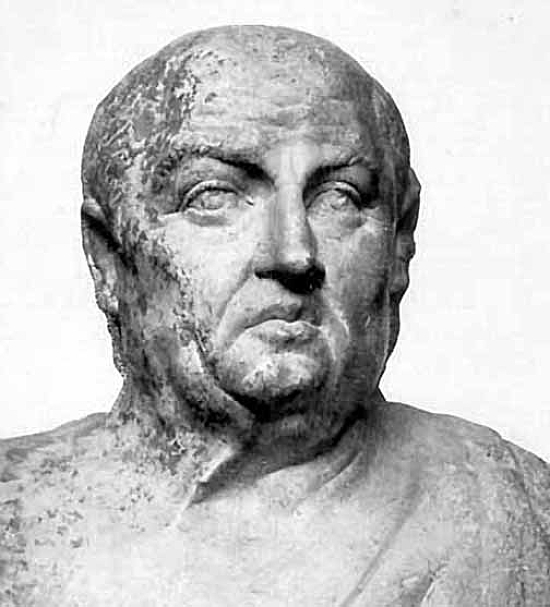
Seneca the Younger
Group Projects: Tuesday, April 29
Seneca's philosophical works
- philosophical dialogues (e.g. de Clementia for young Nero) before 124 Letters/Epistulae Morales & Natural Questions (last years)
- Seneca's Stoicism: sapiens in endless search for knowledge & virtue; ethical values include reason, self-reliance, self-sufficiency, freedom from passion & ambition (tension/conflict for Roman elites), consistency of character, imperviousness to Fortune (chance); living in accordance with Nature (cf. Epicureanism with fundamental differences, esp. Stoic belief in divine providence)
- Letters: practical emphasis on individual conscience, intellectual & moral self-development, separation from group thinking; study & meditation as therapeutic guide to living life well (bene vivere) in control of desires & fears
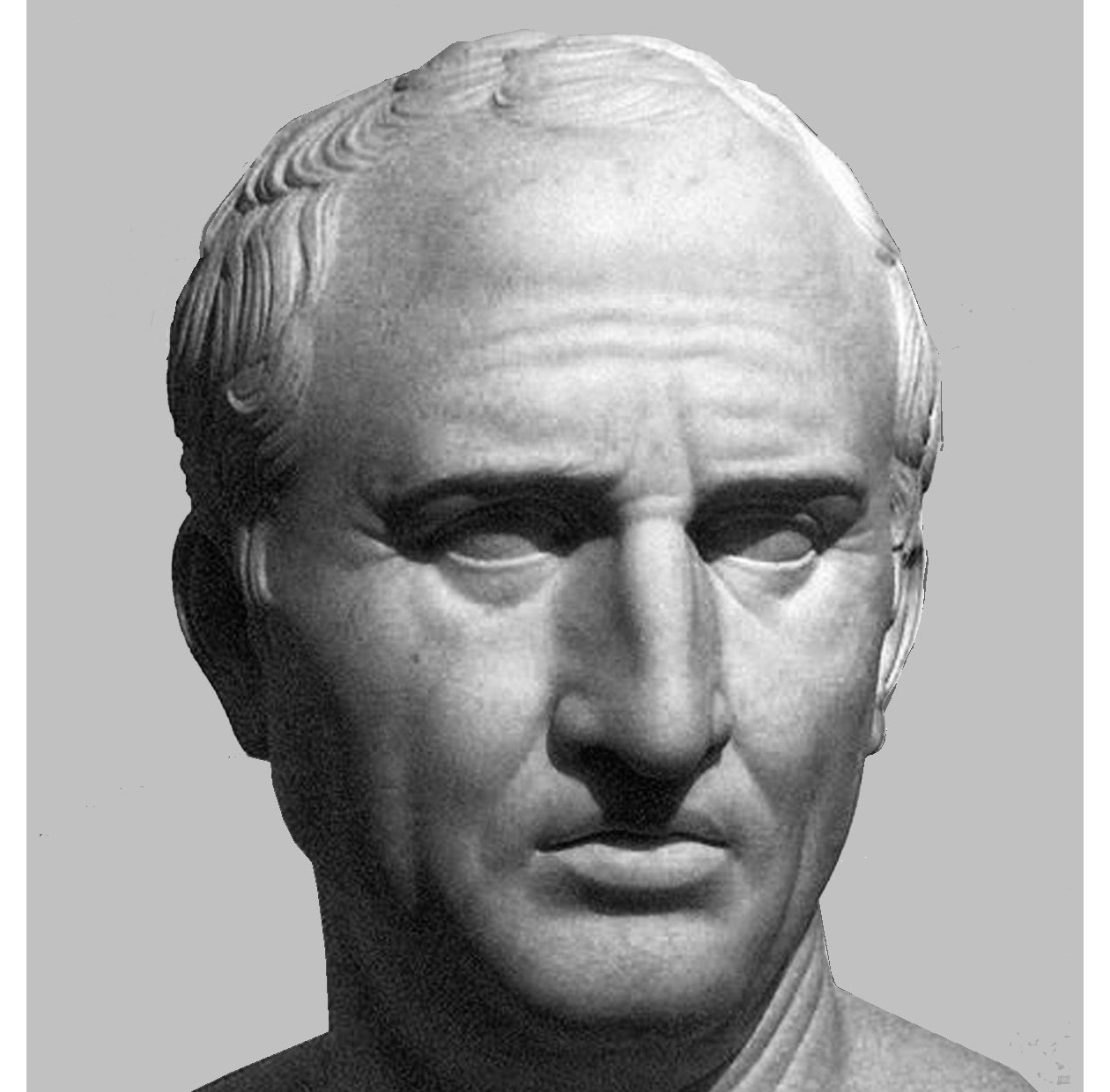
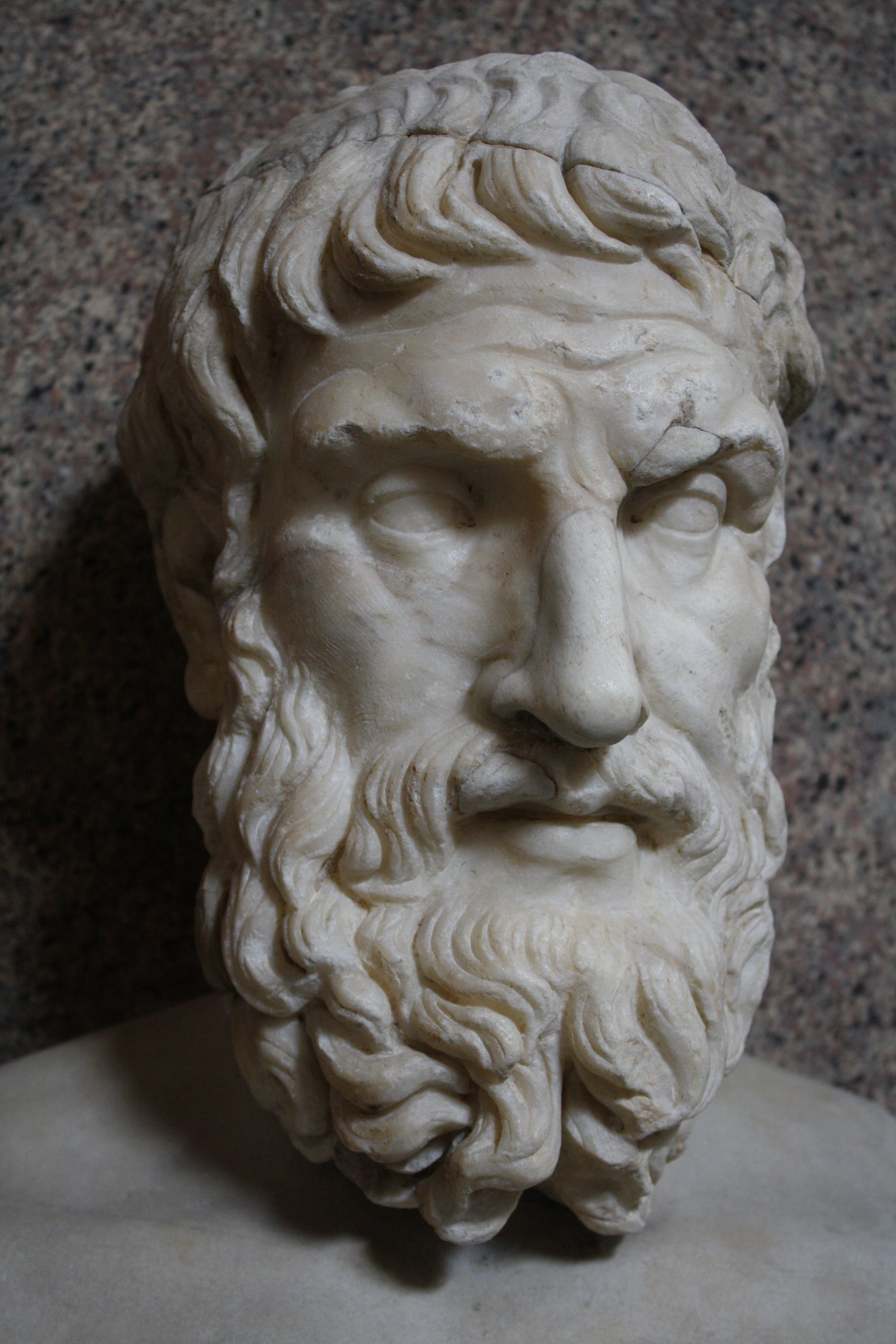
L: Marcus Tullius Cicero (106-43 BCE); R: Epicurus (341-270 BCE)
- Seneca's innovation in Roman epistolary genre: didactic philosophical letters on intellectual & moral improvement (Greek model of Epicurus et al.); bold self-awareness of project (traditions of Greek philosophical letters & Roman personal correspondance, e.g. Cicero's) – Letter 21, response to addressee Lucilius' reluctance to retreat into philosophy & abandon celebrity of public life
Letter 21.4-5 READER: Duncan Y.
Who would know Idomeneus if Epicurus had not inscribed him in his letters? Deep forgetfulness has buried all those grandees and satraps and the king himself from whom men begged for Idomeneus’ office. It is Cicero’s letters that do not allow Atticus’ name to be forgotten. It would not have done Atticus any good to have Agrippa as son-in-law and Tiberius as his granddaughter’s husband and Drusus Caesar as his great-grandchild: he would have been passed over in silence among such great names if Cicero had not attached him to himself. The great depths of time will cover us up and few talents will raise their heads and resist being forgotten, and assert their claims for long before ultimately fading into the same silence. I am promising you, Lucilius, what Epicurus was able to promise his friend; I shall have influence with posterity and bring out names that will persist along with me. Virgil promised eternal memory to two young men and has kept his promise:
Happy pair! If my songs have any power to praise,
No day will ever steal you from a mindful age,
While Aeneas’ house stands on the unshakeable rock
The Capitol, and Rome’s great father rules.
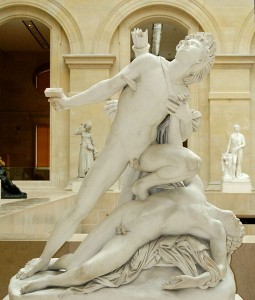
Roman, Nisus & Euryalus (1827)
Letter 21.6 (enduring philosophical memory versus temporary social-political power)
Whenever anyone has been promoted to distinction by Fortune, whenever men were members and agents of another’s power, their influence has been strong and their house thronged as long as they remained successful; after them the memory as quickly failed. The respect for intellects grows, and not only are they honoured in themselves but whatever has been associated with their memory is taken up and preserved.
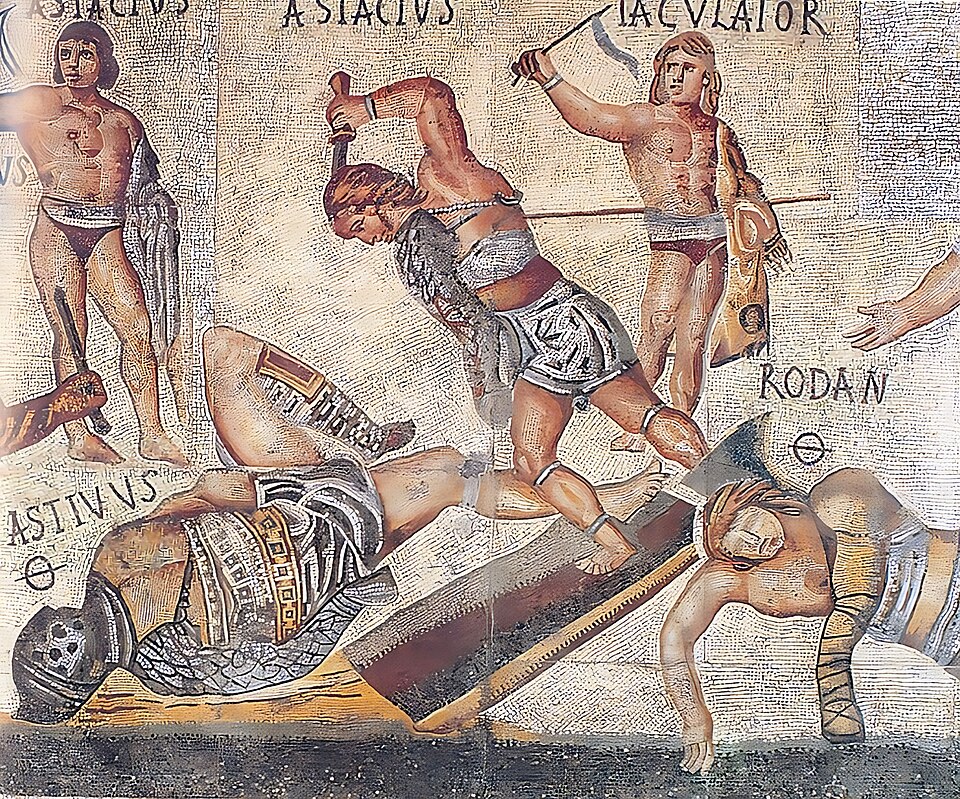
Gladiator mosaic (Villa Borghese, Rome, 4th century CE)
- epistolary form: response-frame to pupil Lucilius (poet/politician); typical elements – opening hook, topic(s) & development, intertexts, closing quote (often Epicurus, Vergil); appeal to "wide" audience (non-philosophers)
Letter 7, hook of Roman spectacles, topic of philosopher's place in society, central idea of external vision/watching (spect-) vs. introspection: "Withdraw into yourself as far as you can, and associate with those who will make you better" (7.8), Epicurean quote (social approval), "For one of us is a good enough audience [theatrum] for the other" (7.11) & closing summary "Let your virtues look inwards" (7.12)
Letter 7.3 (paradox of crowded amphitheater's dehumanizing spectacles)
Association with a large group is harmful; there is no one who does not either recommend some fault to us or impose it upon us or smear it on us when we are unaware. At any rate, the bigger the gathering with which we are mingling, the greater the danger. But nothing is so harmful to good character as to sit idly at a show; it is then that faults sneak up on us more easily because of pleasure. What do think I mean? I come back more miserly, more ambitious, more self-indulgent, worse, more cruel and inhuman, because I was among human beings.
,_Kolosseum_--_2024_--_0610.jpg)
- letters' style: colloquial, simple & straightforward language/presentation (non-specialists), moral exhortations repeated in short, rapid-fire sentences, conceptual metaphors (images from everday life, e.g. medicine, accounting, military, etc.), sententiae (e.g. “In the morning men are thrown to lions and bears, at noon to the spectators", 7.4), engaging imaginary dialogue
Letter 7.4 (dialogue of amphitheater's vicious spectators)
‘But maybe he committed a robbery, or killed a man!’ Just because he killed, did he deserve to suffer this? What did you do, you wretch, to deserve watching this display? ‘Kill him, beat him, burn him!’ ‘Why is he so timid in hurling himself on the steel? Why is he not falling more bravely? Why is he dying so apathetically? Let them battle it out with slashing blows that make open wounds, so that the fighters suffer mutual death strokes while exposing their bare breasts.’ The show is interrupted. ‘Have some men throttled in the interval so there is something to watch.’
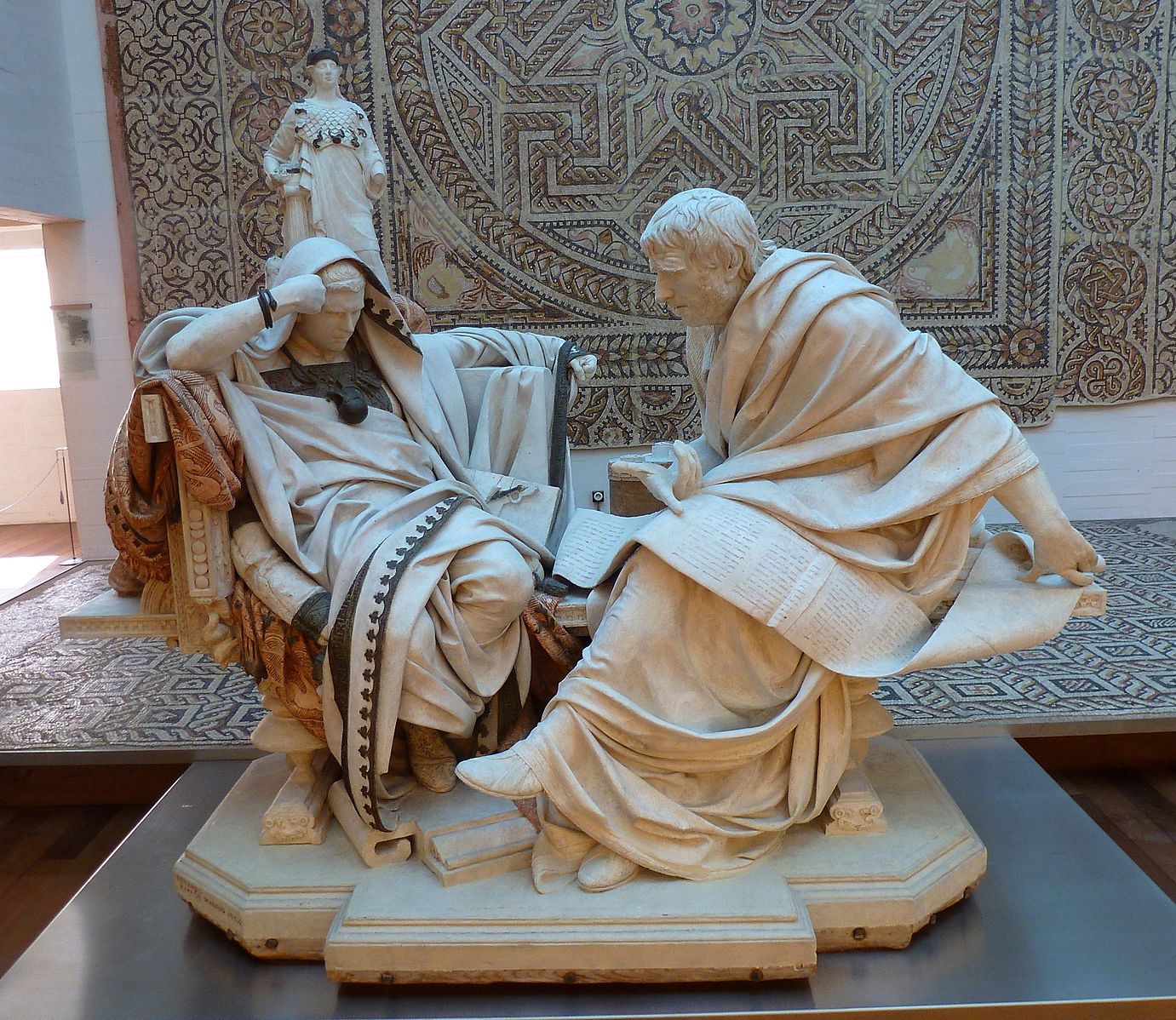
Barrón, Nero & Seneca (1904)
- extensive integration of biographical elements, e.g. Seneca's ill health & apparent asthma (Letter 54)
Letter 54.1-2 (opening hook)
It was my poor health that made my communication slow; it suddenly seized hold of me. You ask: ‘What kind of ill health?’ You have goodreason to ask, since no kind of sickness is unknown to me. But I am chronically enslaved by one disease, and I don’t know why I should call it by its Greek name [asthma], since it can fittingly be called ‘gasping’ [suspirium]. Its onset is short and like a storm; it usually stops within the hour. For who exhales for long? All the discomforts and dangers of the body have passed through me, but none seems to me more distressing. How could it be otherwise, since any other condition is sickness, but this is like breathing one’s last. That is why doctors call this ‘a rehearsal for death’.
Letter 54.3-4 (broader reflection on nature of death)
I say to myself: ‘What is this? Is death testing me so often? Well, let it then. But I have had a long experience of this.’ ‘When was that?’ you say. Before I was born. Death is not-being. But I already know what that is like. It will be the same after me as it was before. If this entails any torment, then it must have done so previously, before we came into the light of day. But we felt no trouble at that time. I ask you, wouldn’t you say a man was very stupid to think a lantern was worse off when it was put out than before it was lit? We too are put out and set alight: in the time between we have some experiences, but on either side there is deep freedom from care. This is where we are mistaken, dear Lucilius, because we think death is what follows, although it both preceded and will follow us; whatever there was before us is death. What difference does it make whether you have not yet begun or you are coming to an end when the effect of each thing is not to exist?
- practical Stoic tests: preparing for changes of fortune (death) without fear & anxiety
Letter 18 – practicing self-denial & discipline during Saturnalia (hook): rehearsal of poverty, wealth an inconsequential Stoic "indifferent" tied to fortune ("there is no reason for you to think you are doing a great deal (for you are doing what many thousands of slaves and many thousand poor men do)", 18.8)
Letter 18.5 (the wealthy person's test)
. . .
set aside a few days in which you will content yourself with the smallest and poorest diet and rough, shaggy clothing, and to say to yourself: 'Is this what I was afraid of?' Let your mind prepare itself for these difficult circumstances in freedom from care, and let it be strengthened against the injustices of fortune while still enjoying her favours.
Letter 18.13 (cultivating indifference to wealth)
Dare, my guest, to scorn wealth
And make yourself worthy of the divine [Aeneid 8.364-5, Evander to Aeneas]
No one is worthy of the God unless he despises possessions [Hercules as Stoic model]; I am not forbidding you to own them, but I want to ensure that you own them without fear, and you will only achieve this in one way, if you persuade yourself that you will live happily even without them, if you always look on them as if they were going to disappear.
Letter 56: living above public bath as test of introspective philosopher's stable & calm mind's imperviousness to external distractions
.jpg)
Tepidarium of bath complex (Pompeii, 1st century CE)
Letter 56.1-2 READER: Leah
Just imagine all the varieties of cries that can fill the ears with loathing; when the tougher fellows are exercising and thrusting arms heavy with lead, when they are either straining or imitating those under strain, I hear their grunts, and whenever they let out the breath they have been holding, I hear their whistles and bitter panting: when I come upon some feeble fellow content with the common-or-garden massage, I hear the crack of hands slapping the shoulders, which changes pitch as it hits them flat or hollowed. But if the umpire of the ballgame joins in and begins to count the balls, that is the end. Now listen to the brawler and the thief caught in the act, and the man who likes the sound of his own voice in the bath. Then add those who leap into the pool with a great splash, as well as those whose voices, if nothing else, are loud and clear. Imagine the depilator suddenly emitting his thin, shrill cry, calculated to make him more conspicuous, constantly uttering and never silent except when he is plucking the underarms and forcing the other man to cry out instead. Now I hear the different cries of the cakeseller and the sausage-seller and pastrycook and all the hawkers from the snack-bars selling their wares with a special distinct intonation.
Letter 56.15 (humorous close with epic intexts)
I shall move out of this place. I wanted to test it and put myself on trial. What need to suffer any longer, since Ulysses found such an easy cure for his comrades against the Sirens?
- Letter 47, Seneca as slaveholder & philosopher: contradictions in enslavement exposed ("tool with a voice"), inability to "[call] slaves to take the cap of liberty" (47.18), i.e. acknowledge inalienable human right to freedom & bodily autonomy; advocates benevolent paternalism (dining & conversing with slaves, master's restraint in cruelty) with focus on master's moral self-improvement & self-interest/security
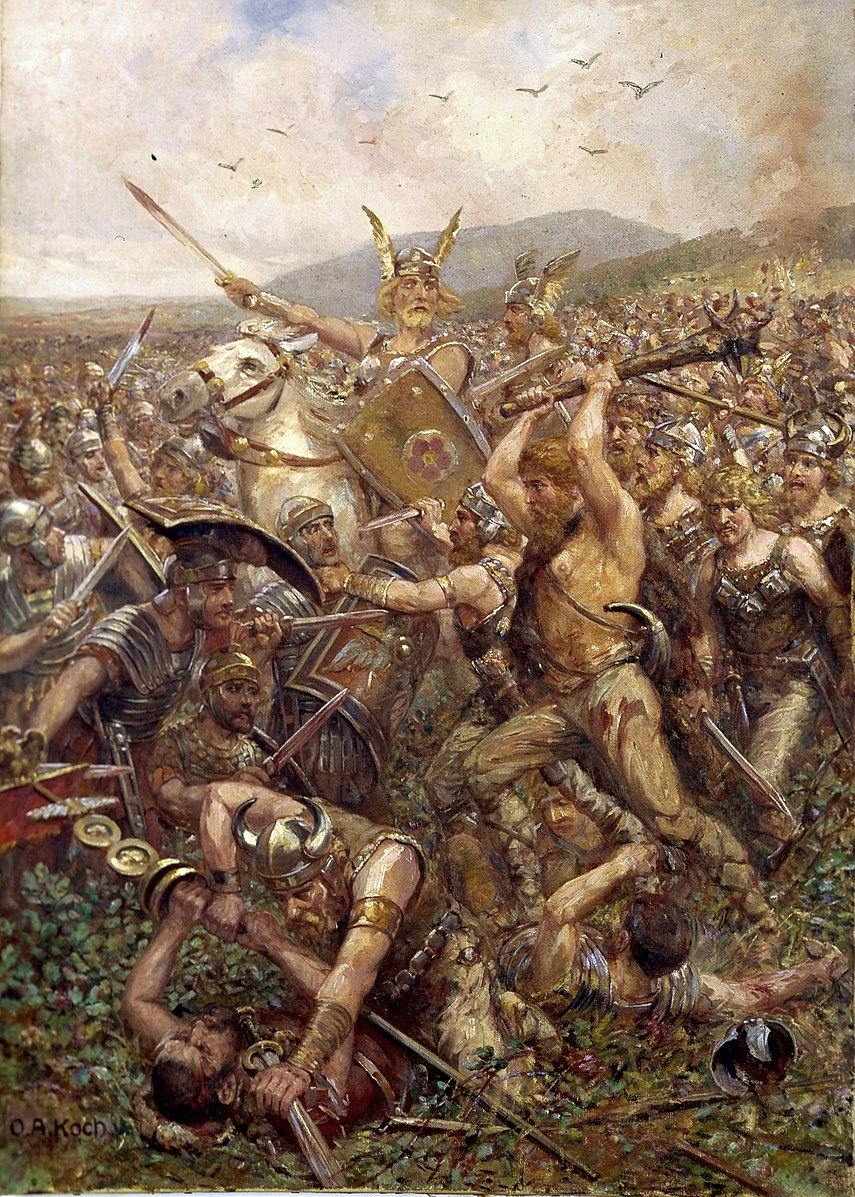
_Peter.jpg)
L: Koch, Slaughter of Varus (1909); R: Janssen, Victorious Advance of Hermann/Arminius (1873)
Letter 47.10 (enslavement an arbitrary construct/product of chance, vs. "natural" born slave-inferior)
Just think that the fellow you call your slave was born from the same seeds and enjoyed the same sky, breathed, lived and died on equal terms! You are just as able to look on him as freeborn as he can look on you as a slave. In the defeat of Varus [= clades Variana, i.e. defeat by Arminius in Battle of Teutoburg Forest, 9 CE] Fortune laid low many men of splendid birth aiming at the rank of senator through military service; it made one a shepherd, another a janitor. So now go and despise a man whose fortune you may descend to while you are despising him. [ethics of reciprocity, ". . . live with an inferior as you would wish a superior to live with you", 47.11]
Letter 47.4 (master's goal of absolute loyalty)
But slaves who not only exchanged talk in front of their masters but with them, whose mouth was not gagged, were ready to offer their necks for their master and avert impending danger onto their own heads; they chattered at dinners but were silent under torture.
Letter 47.17ff. (winning slaves' devotion)
So there is no reason for those disdainful men to discourage you from making yourself agreeable to your slaves and not arrogantly superior; let them be devoted to you rather than fear you. . . . The man who is paid respect is loved; love cannot be mixed with fear. So I judge that you are acting with absolute correctness in not wanting to be feared by your slaves, and using only verbal scolding; only animals are corrected by blows.

Photo of Union soldier & former slave
Letter 47.17 (free person's figurative slavery – overlooking very real deprivations)
Show me who is not a slave. One man is slave to lust, another to greed, another to ambition, all of us to hope and fear. I will give you an ex-consul enslaved to an old woman, a rich man to his maidservant, I will show you the most nobly born young men who have made themselves slaves of pantomime dancers; no slavery is more shameful than self-imposed slavery.
Group Projects; Groups





,_Kolosseum_--_2024_--_0610.jpg)

.jpg)

_Peter.jpg)
